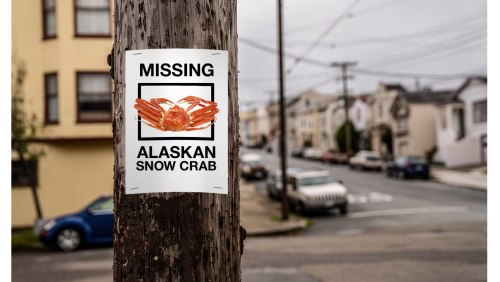Crabs, the Climate, Congress, and the Court
November 2, 2022 by Danny Shokry

Background
Seafood lovers are familiar with the coveted Alaskan snow crabs. This culinary delicacy made headlines in October 2022, when experts reported that an estimated one billion snow crabs in the Bering Sea had disappeared over the prior two years.[i] This population loss led the Alaska Department of Fish and Game to cancel the winter snow crabbing season for the first time in Alaska’s history.[ii] This announcement occurred almost exactly one year after Alaska had canceled the Alaskan king crabbing season due to low population levels of Alaskan king crabs.[iii]
While it’s unclear what exactly caused the disappearance of the snow crabs, experts generally agree that the disappearance is likely linked to climate change.[iv] One theory correlates snow crab decline with raising water temperatures. During the summer, snow crabs move to cold pools on the Bering seafloors.[v] As ocean temperatures rise, these cold pools shrink, thus concentrating the snow crab populations in a smaller habitat – making the crabs more susceptible to disease, starvation, and predation.[vi]
The Effects
The announcement and cause of the snow crabs’ population decline are alarming for several reasons. First, snow crabs for human consumption will be substantially more scarce. Second, the population decline represents a worrying trend. Alaska’s fisheries, which produce over 60% of the country’s seafood,[vii] have recently seen two major population declines: king crabs and now snow crabs. This is especially worrisome given that Alaska’s waters are warming faster than any other region in the world.[viii] The problems that Alaskan fisheries experience today could occur elsewhere when water temperatures rise in other ecosystems.
In addition to ecological impacts and climate concerns, canceling the snow crab season may cost various entities hundreds of millions of dollars, including: $200 million in lost revenue for Alaskan fishermen,[ix]$132 million in federal disaster aid funding,[x] and millions of dollars in tax revenue for Alaskan cities.[xi]
The consequences Alaska now faces may be an omen for the impacts of climate change – namely food insecurity, biodiversity loss, and economic depressions. Importantly, these impacts are not equally spread throughout society. In Alaska, for instance, indigenous peoples’ livelihoods and identities are especially vulnerable to the impacts of climate change,[xii] and the crab population decline in Alaska is more likely to affect blue collar workers and small businesses than others.[xiii]
Less than four months prior to the discovery of the snow crabs’ population decline, the Supreme Court’s decision in West Virginia v. EPA erected a hurdle in the country’s efforts to mitigate climate change. Applying the major questions doctrine,[xiv] the Court held that Section 111 of the Clean Air Act did not give “clear congressional authorization” for the EPA to regulate nationwide energy production by ordering energy producers to use “generation shifting” — switching from fossil fuels to renewable energy.[xv] Unfortunately, the landmark Inflation Reduction Act does not empower the EPA to utilize generation shifting, and thus does not overturn West Virginia v. EPA as many had hoped.[xvi] The Inflation Reduction Act does, however, codify the Court’s earlier finding in Massachusetts v. EPA that the EPA has the authority to regulate greenhouse gases.[xvii]
Hope is not lost
The consensus among experts is clear – climate change is an issue that needs to be addressed.[xviii]The recent drop-off in Alaska’s snow crab and king crab populations is both a recent reminder of the issues at stake and a harbinger of worse losses to come. Recent Supreme Court decisions make clear that the Supreme Court may not be receptive to climate change mitigation efforts. While Congress did not overturnWest Virginia v. EPA in the Inflation Reduction Act, the Act nonetheless provides glimmers of hope as it funds other aggressive climate mitigation efforts.[xix] Overall, Congress may be the best forum to mitigate climate change, whether it is through passing legislation or clearly authorizing administrative agencies to regulate greenhouse gases.
[i] Laura Reiley, Alaska’s snow crabs have disappeared. Where they went is a mystery, The Washington Post (Oct. 14, 2022), https://www.washingtonpost.com/business/2022/08/21/alaska-crab-climate/
[ii] Id.
[iii] Id.
[iv] Evan Bush, Alaska cancels snow crab season, threatening key economic driver, NBC News (Oct. 14, 2022), https://www.nbcnews.com/science/environment/alaska-cancels-snow-crab-season-threatening-key-economic-driver-rcna51910.
[v] Id.
[vi] Id.
[vii] Jonathan Vigliotti, Alaska’s snow crab season canceled as officials investigate disappearance of an estimated 1 billion crabs, CBS News (Oct. 14, 2022), https://www.cbsnews.com/news/fishing-alaska-snow-crab-season-canceled-investigation-climate-change/.
[viii] Basile Poujol, Andreas F. Prein, Andrew J. Newman, Kilometer-scale modeling projects a tripling of Alaskan convective storms in future climate, 55 Climate Dynamics 3543, 3543 (2020).
[ix] Reiley, supra note 1.
[x] Id.
[xi] Bush, supra note 4.
[xii] U.S. Environmental Protection Agency, Climate Change and the Health of Indigenous Populations, available at https://www.epa.gov/climate-change/climate-change-and-health-indigenous-populations#:~:text=Climate%20change%20threatens%20places%20and,cultivated%20crops%20in%20many%20regions. (last updated August 19, 2022).
[xiii] Reiley, supra note 1.
[xiv] West Virginia v. EPA, 142 S. Ct. 2587, 2610 (2022).
[xv] Id. at 2613.
[xvi] Patrick Parenteau, the Inflation Reduction Act doesn’t get around the Supreme Court’s climate ruling in West Virginia v. EPA, but it does strengthen EPA’s future abilities, The Conversation, https://theconversation.com/the-inflation-reduction-act-doesnt-get-around-the-supreme-courts-climate-ruling-in-west-virginia-v-epa-but-it-does-strengthen-epas-future-abilities-189279 (last accessed October 14, 2022).
[xvii] Massachusetts v. EPA, 549 U.S. 497, 528 (2007).
[xviii] See The Intergovernmental Panel on Climate Change, 2018: Summary for Policymakers, 3 (2018).
[xix] EarthJustice, What the Inflation Reduction Act Means for Climate (Aug. 16, 2022), https://earthjustice.org/brief/2022/what-the-inflation-reduction-act-means-for-climate.

